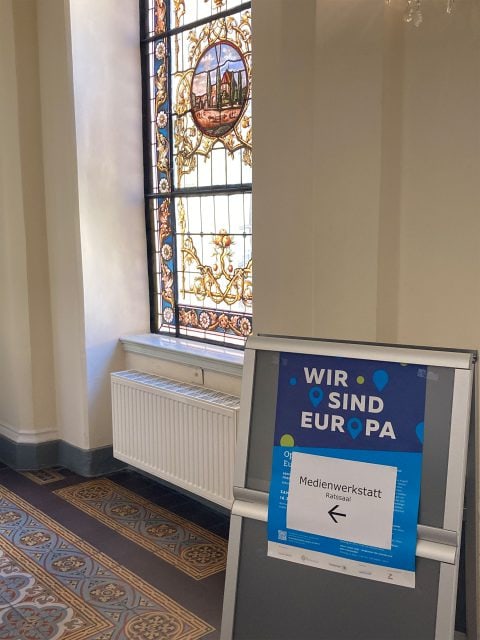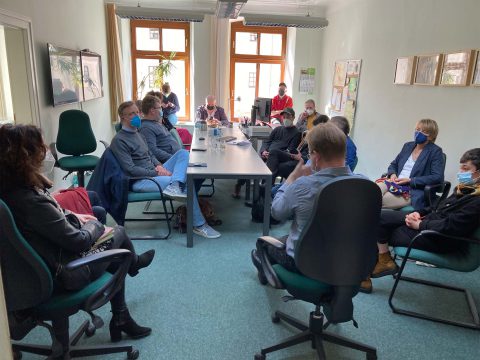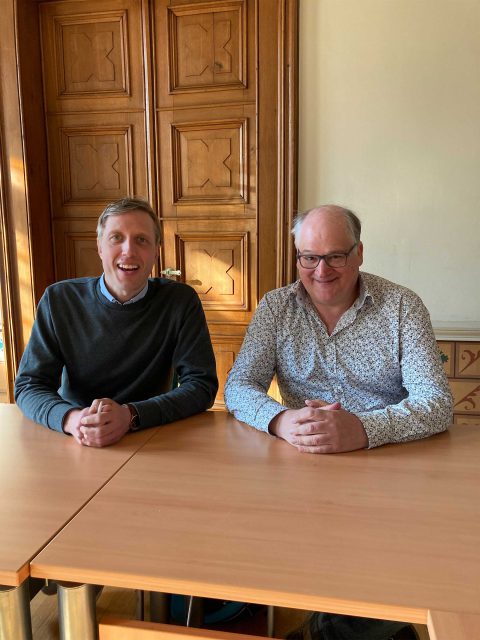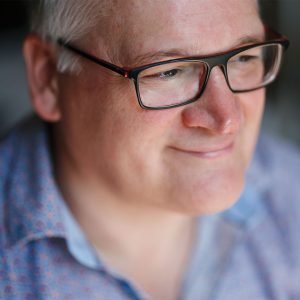There is an interest in the neighbours, but media serving Germans, Czechs and Poles alike in the border area are still a dream.
By Onno Falkena
“There is lots of media collaboration between France and Germany, but in the Dreiländereck Germany, Poland and Czech Republic, we are still waiting for it ever since the borders disappeared.” Journalist Axel Arlt of the Sorbian daily Serbske Nowiny from Bautzen was one of the 15 journalists from Germany, Greece, United Kingdom, Poland and The Netherlands who explored the chances and the odds of more collaboration between the media in Saxony/Sachsen and the neighboring regions in Poland and the Czech Republic at the media workshop in Zittau, organised by Wir sind Europa and the municipality of Zittau. The impatience of multilingual journalist Arlt is understandable. While most journalists in the area have difficulties speaking and understanding the language of their neighbors, Arlt is in a different position. As a Sorbian, a Slavic minority in Germany, he speaks and reads Czech without any problem. Sorbs are therefore in a privileged position to ease German-Czech collaboration, because they speak both languages and are also aware of the cultural differences between the two nations.
Sorbs as mediators in German-Czech collaboration?
But there are more reasons why media collaboration between the three countries is not easy. Public spending on public broadcasters in Germany is much higher than in the two neighboring countries. And while the free state of Saxony in federal Germany has its own budget and media policy, the neighboring regions in the Czech Republic and Poland are more dependent for any international collaboration from budgets and decisions from the national governments in Prague and Warsaw.

There have been great ambitions in the past, like a plan for a German-Czech-Polish version of the French-German TV channel Arte. When the plan for the channel was ready after five years of hard work it was finally rejected by the new Polish government of the political party PiS, who was not interested in launching a new German-Slavic TV channel for culture and documentaries.
Nonetheless, Mitteldeutsche Rundfunk (MDR) claims that reporting about its neighbors is part of its DNA. Therefore, on the 2nd of November 2021 MDR opened its first binational studio in European city (Europastadt) Görlitz/Zgorzelec. In this studio a German-Polish team, led by the Sorbian journalist Roman Nuck, researches and produces common reports from both sides of border river Neisse for the MDR and its Polish partner Radio Wroclaw. The MDR also broadcasts every Sunday the radio program ‘Mensch Nachbar’ with Polish and Czech perspectives on the news from German speaking journalists from Wroclaw in Poland and Liberec in the Czech Republic. Radio Wroclaw returns the favour with a program about German issues, playing German music.
No real collaboration between media across the border so far
In the city of Zittau Radio Zett, das freie Radio im Dreiländereck (volné radio v hrnicnim trojúhelníku), aims to be the radio for the whole area, including its neighbours from Poland and the Czech Republic. But Radio Zett appears to be rather vulnerable with a small voluntary staff. According to newspaper Sächsische Zeitung, recently a few volunteers left Radio Zett after a conflict, announcing that they will continue to work as Interessengemeinschaft Radio Zett. There are therefore now two Radio Zetts online active, which appears to be rather unfortunate for a small community like Zittau.
At lunchtime the whole group of the media workshop visited the small newsroom of the Zittau office of the aforementioned Sächsische Zeitung. In recent years this newspaper shifted from a classic daily newspaper on paper to a medium which is very active online and on social media. Chief Thomas Mielke informed the visiting journalists that ‘the economic survival’ of his newspaper was at stake. “Our readers are very loyal, but we have very few subscribers under 40. We therefore had to develop an online-first-strategy, and seduce our readers to pay for the articles. Part of this strategy is the criterium of the so-called ‘three e’s’: the stories in which the newspaper invests should be ‘emotional, exclusive and excellent’.

Freelance journalist Steffi Hentschke, who originates from Zittau but now lives and works in Tel Aviv, inquired whether the journalistic criteria also shifted towards a more popular direction, when the new strategy was introduced. Hentschke specifically criticized an article based upon the local ‘Gerüchteküche’, stating that mayor Zenker may have lost his driving license. the paywall however prohibited her to read the whole story. “We have to sell our news”, Mielke admitted, “but we only published this after carefully researching the facts.” Modern methods to measure the readership of articles both online and in the paper led to a shift of focus of the journalists. “Only 8% read articles about ‘high culture’ like theatre and ballet. It therefore would be unwise to invest much time effort in such topics.” Mielke also tries to avoid publishing too many articles about politics. “Politik interessiert die Leute nur, wenn es persönliche Betroffenheit gibt.” (“People are only interested in politics when their is a personal concern.“)
Readers of Sächsische Zeitung are interested to read what is going on in neighboring Czech Republic and Poland. They regularly go there to shop or to walk in the mountains. The Sächsische Zeitung covers the neighboring area with the help of a German journalist living across the border. In the newsroom the knowledge of both the Czech and Polish language is very limited and there is also no collaboration with media across the border. “I would welcome some kind of collaboration, but I simply don’t know with whom we should collaborate.” In the newsroom Mielke and his guests had a very lively discussion about the challenges of a newspaper with a monopoly in a small city like Zittau. The visit therefore lasted longer than planned.
The language barrier
TV Bogatynia from Bogatynia in Poland has comparable problems finding partners to collaborate with the neighbouring regions in Germany and the Czech Republic. “Recently I found someone in Czech Hradek nad Nisou who agreed to make videos for us”, Magdalena Koscianska explains. ”But Zittau is important for us and we have no one in Zittau yet.” Koscianska sometimes goes herself or sends one of her reporters, interviewing the locals in Zittau in English, because most of the staff of TV Bogatynia do not speak German. Of course Koscianska also meets people in Zittau who speak some Polish, but they are a minority as well.

Language is absolutely an issue in the field of German/Czech/Polish media collaboration. Only fluent bilingual or even trilingual journalists can work easily across the borders and have access to all information they need. With younger generations English can be an alternative to communicate, but as the main language of a media outlet it has its limitations. A radio programme in English might work for an interested younger audience, but in the area around Zittau it would serve a niche audience at the most and not be a mass medium. Successful media should always try to produce content in the preferred language of its audience, with respect and appreciation for linguistic diversity. A successful cross border medium for the whole border area therefore will need to translate stories, or, in case of video, work with subtitles, regardless of the effort and the expenses. However, it may very well be possible that subsidies can be found for these expenses.
At the end of a long but also very lively workshop most attendants agreed about the following:
* It is always interesting and worthwhile to research stories from several perspectives. This is a kind of collaboration which can start at relatively low costs.
* Locally there is an interest and need in cross-border media collaboration. Specific funds for this issue or a clear policy to stimulate cross border media collaboration might help. However, local initiatives sometimes are not even aware of the funds and possibilities which already exist. It may be interesting to organise another meeting for journalists from the three countries after some time at the condition that there will be attendance from the Czech site as well.
* Language is an issue. German monolingualism is just as much an issue as Polish or Czech monolingualism. But monolingualism is a curable illness. New generations and also journalists in the area should be stimulated to learn each others’ languages according to the European goal that all EU citizens should be stimulated to learn at least three languages. English can be useful as lingua franca of the 21st century, but has is limitations as language of publication.
* Zittau could be an interesting place for a ‘Medialab’ developing 3-country journalism in the area. The EU has a media program, also designed for new forms of media and new forms of collaboration. In order to develop something like this, one needs a leading partner. At present I do not see a ‘logical’ leading partner for such a development in Zittau.
Other areas which could be explored:
* The Czech city of Liberec is candidate European Capital of Culture since December last year. This means that Liberec is still developing its program. It could be interesting to investigate if they are interested in some kind of media collaboration with former candidate ECoC Zittau. Both cities are already official partners for some time.
* The Sorbian Parliament / Serbski Sejm developed a project called ‘Lusatia Glow’ for collaboration between border areas /multilingual areas in Europe. It might be interesting to research the possibilities, one of the politicians of the Open Space suggested.
Last but not least:
* Elections for the Mayor of Zittau are coming up in June 2022 (with possible second round in July 2022). If candidate Zenker is not re-elected or even replaced by a candidate of AfD it may become more complicated to develop European projects in Zittau.
—
Onno Falkena is a journalist at Frisian broadcaster Omrop Fryslân.
